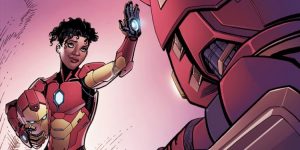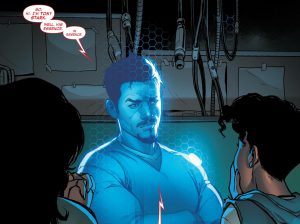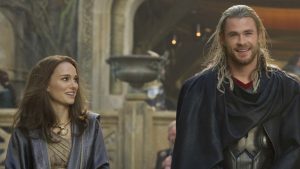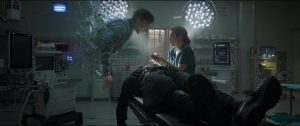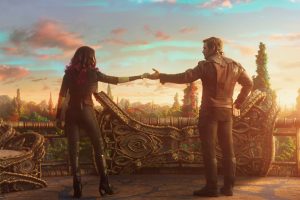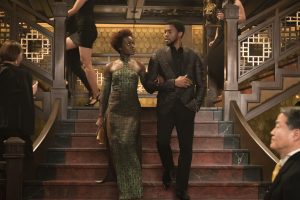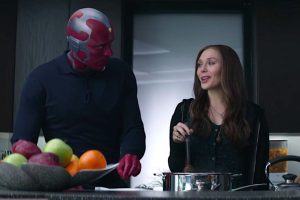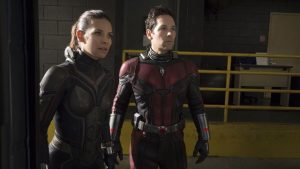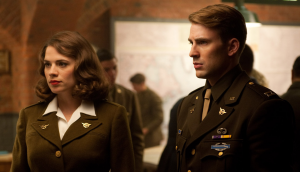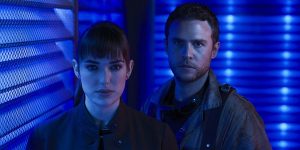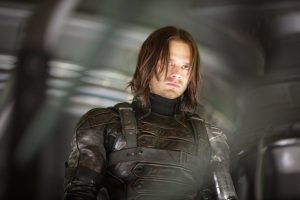SPOILERS FOR WANDAVISION AHEAD!
The first two episodes of Marvel’s WandaVision, despite being relatively short to emulate the classic sitcoms they’re based on, were packed full of zany details, hidden Easter eggs, and clues pertaining to the larger mystery that the series brilliantly starts building right from the get-go. It’s pretty obvious at this point that something is deeply wrong in the charmingly antiquated town of Westview, and that both the town and its residents are being manipulated by something – or someone. But perhaps the strangest element in the series so far is its strategic usage of commercial breaks.

About halfway through each episode, the WandaVision broadcast is interrupted by an in-universe commercial, where a smirking salesman (played by Ithamar Enriquez) comes onscreen, accompanied by an eerily grinning woman (played by Victoria Blade), to briefly explain why we should be purchasing some newfangled household appliance or accessory. At first, this might just seem like a funny gimmick to make the ad-free streaming series feel more like an actual TV sitcom, but these infomercial segments do more than just add to WandaVision‘s retro aesthetic. The products on sale in these segments, and even the salespeople themselves, appear to be intrinsically tied into the series’ over-arching mystery.
As many fans (myself included) have already pointed out, the products have connections to the larger MCU – and, specifically, to traumatic and painful moments in Wanda Maximoff’s life story, which you can read more about here. The first commercial advertises a toaster called the Toast Mate 2000, designed by none other than Stark Industries. Although this episode of WandaVision technically takes place about a decade before Tony Stark’s birth (sort of), it’s clear from context that this innocuous toaster is a symbolic stand-in for the Stark Industries bomb that killed both of Wanda’s parents during a period of civil unrest in her home-town of Sokovia – the impetus for her initial resentment of Stark, and part of her motive for hypnotizing him into taking the Mind Stone. The toaster’s single, blinking red light (a bold use of color in the black-and-white episode), and the device’s unsettling, fast-paced beeping sound just before popping out two fully-toasted slices of bread, makes this metaphor particularly creepy and morbid – but hey, it can apparently warm meatloaf and cherry pie. The machine’s sinister and demanding tagline reads: “Forget your past – this is your future!”.
Before we move on, I’d like to note that the Toast Mate 2000 probably also doubles as a clever nod to one of Vision’s most notable nicknames in the comics, “the talking toaster”…making Vision, quite literally, Wanda’s Toast(er) Mate. This series is so unapologetically weird.

The second commercial is much shorter, and has a mini-story to it, more like a modern advertisement. Our salesman is dressed to the nines, clearly getting ready for an evening out, and voice-over informs us that “a man is never fully dressed without two important accessories”, which turn out to be “his special lady” – because misogyny is just as prevalent in these ads as in real-life ones – and “his Strücker”; a fancy, expensive-looking Swiss watch. As the camera zooms in on a display model of the Strücker watch, we can see that its face is marked with the tentacled-skull logo of the Neo-Nazi group, HYDRA. Strücker is obviously a reference to HYDRA scientist Wolfgang von Strücker, who used the Mind Stone to experiment on Wanda and her twin brother in a vile attempt to create a superhuman. It’s safe to say the memory of being locked in a cell for months and exposed to the raw energy of an Infinity Stone was probably uncomfortable for Wanda, at the very least. The watch’s tagline is marginally less creepy than the toaster’s, but perhaps more significant: “Strücker – he’ll make time for you.”
The commercials are different in style and tone, but they have striking similarities – even apart from featuring the same two actors. They both contain unnervingly sexist dialogue: with the Toast Mate 2000 being marketed towards housewives to save them the embarrassment of burning their husbands’ toast, and the Strücker commercial suggesting that women are accessories to complete a man’s formal attire. This could just be a jab at the insidious sexism prevalent in the era’s marketing (and too often carried over into modern day marketing, including for the early days of the MCU), or it could have a larger thematic meaning we can’t quite grasp yet. Another similarity is with the sound effects: the beeping of the toaster and the ticking of the watch, and how both accelerate rapidly.
If we assume these objects really are meant to represent Wanda’s worst memories, there’s a few reasons why they might be being advertised to her or to others in Westview. Perhaps these ads, like the toy helicopter Wanda finds in her rose-bush, the voice in the radio static, and the entire character of “Geraldine”, represent attempts by S.W.O.R.D. to infiltrate WandaVision using subliminal messaging to get into her head that Wanda has re-contextualized into something that fits with the internal logic of her retro reality. They might be trying to help her fill in the blanks of her past (though if that’s the case, they’re doing an awful job of it, focusing on the things she least wants to remember).

To me, it seems more plausible that this is the work of someone like the devilish Mephisto, believed to be the evil mastermind behind WandaVision. And if that’s the case, I think there’s a good possibility that perhaps Mephisto isn’t directing these ads at Wanda herself, but at the other inhabitants of Westview – extracting Wanda’s memories of the most formative moments in her life and selling them off as part of an elaborate attempt to strip away her identity. So far we haven’t seen Wanda herself view or acknowledge any of these ads, and she doesn’t own a Toast Mate 2000, nor does Vision wear a Strücker…but maybe someone else in Westview does. And as more of Wanda’s traumatic memories get sold off, and she becomes more content in her new life as a result, perhaps time is running out for her to wake up to reality – lending a sense of urgency to the commercials, and explaining the sped-up sound effects in both. Mephisto himself might be the salesman, while the woman with him could be another version of the sorceress Agatha Harkness (whom many of us believe is currently disguised as Westview’s resident gossip, Agnes).
Whatever the case, it’s clear that a pattern is being established in these commercials: so keep a close eye on them going forward. Next week’s should logically feature a nod to Wanda’s time with the homicidal robot Ultron and/or the death of her twin brother Pietro Maximoff, and may give us more details about how the commercials fit into Wanda’s story, and who the salespeople really are.
But what do you think? What do you expect from next week’s WandaVision commercial? Share your own thoughts, theories, and opinions, in the comments below!
